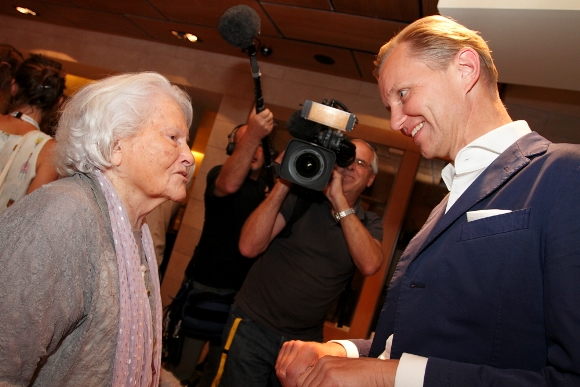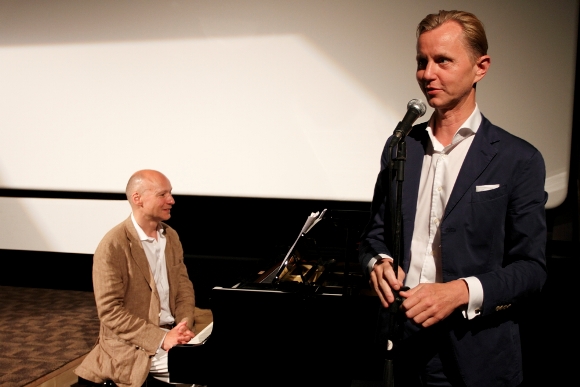Everybody waiting to enter the screening hall agrees: we came for the music. Who does not like the tunes of Marlene Dietrich, the Comedian Harmonists and others who performed dance and film music in Germany of the 1920s and 1930s?
It is this same attitude which attracted the audience two years ago, when Max Raabe and the Palast Orchester came to Israel for their first tour. Greeting the audience in Hebrew immediately broke the ice and although they were not known to the public at large, the band experienced immediate success; the critics were favorable.
The tour was documented and the resulting film, Max Raabe in Israel, was presented in a festive screening at the Jerusalem Film Festival on July 12th, in the presence of Max Raabe.

Touring a country, even for a performing musician, does not confine itself to the concert hall, especially not when you are a German band travelling in Israel. Encounters with German-born citizens are part of the program. Now in their 80s or older, they remember their younger days, as well as some of the tunes they grew up with. Often combined with a kind of yearning, some of them will also bring out keepsake of bygone times which changed their life and made them change country. Their offspring too have something to say about a past they never experienced. The past holds a place in their minds and affects their way of life even into the 3rd generation.
On a parallel track, we get to know Max Raabe and some members of his orchestra through many interviews throughout the film. The tall, blond, blue eyed, elegant looking singer and band leader answers questions in a refreshingly honest manner. He is proudly aware of the fact that a large part of his repertoire was written by Jewish composers and that the beginning of the war ended performance and promotion of those songs full of humor and irony. On a different note, he admits to have started the tour with some trepidation, knowing that his tunes might strike certain chords with the audience. The question was: what chord? There are also questions for which he has no answer and which appear to make him uneasy for just one moment.
Of course we get to hear in between a song or two, presented in a clear voice and a slightly distant manner. Pictures off and on stage alternate between those taken in concert and those of their trip through the country and their encounters.

Before the screening of the film, Max Raabe had the following words for the audience: “It is a gift for me to be an artist; it was a gift for me to be invited.” At the end of the film he offered a gift to the festival audience by singing two songs accompanied on the piano by Christoph Israel and on the viola by Emmanuel Witzthum.
Max Raabe in Israel
(Germany 2012, 90 min, German with English subtitles)
Directors: Brigitte Bertele and Julia Willman
Prod.: Sabine Scharnagl
Sc.: Brigitte Bertele, Julia Willman
Ph.: Lars Barthel, Yuval Cohen, Jörg Jeschel, Sören Beseler
Festivals: Berlin Jewish Film Festival
The Jerusalem Film Festival screening was made possible thanks to the efforts of Sabine Schangal, Nicola Galliner & Ruth Diskin.
Image credit: Philip Touitou





